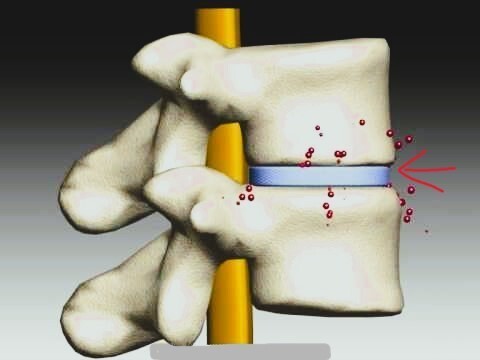
The vertebral disc, an essential component of the spinal column, plays a critical role in providing flexibility, support, and shock absorption to the spine. These discs, situated between the vertebrae, are pivotal in enabling a wide range of movements while also bearing the load of the body's upper part.
A key process that ensures the health and functionality of these discs is
imbibition, a mechanism vital for disc nutrition and hydration.
This article delves into the importance of imbibition in vertebral disc health, the impact of dehydration and prolonged sitting on disc pathology, and the potential for disc degeneration.
Vertebral Discs Imbibition refers to the process by which vertebral discs absorb water. The central part of the disc, known as the nucleus pulposus, acts somewhat like a sponge, absorbing water and nutrients from the surrounding tissues. This absorption is crucial for maintaining the disc's ability to withstand compression and support the spinal vertebrae.
During physical activities, the disc slightly compresses, expelling water and waste products. When the body is at rest, the disc rehydrates, absorbing water along with essential nutrients. This cycle of compression and rehydration is essential for disc health, providing necessary nourishment and removing waste.
The Impact of Dehydration and Prolonged Sitting
Dehydration and Disc Health: Dehydration significantly affects the imbibition process, leading to reduced water content within the discs. This reduction in hydration compromises the disc's ability to maintain its height and elasticity, thereby diminishing its shock-absorbing capabilities. Over time, a dehydrated disc becomes more susceptible to tears, cracks, and other forms of damage, contributing to disc pathology and potentially leading to conditions such as disc herniation or bulging discs.
Prolonged Sitting and Disc Pressure: Prolonged sitting, especially with poor posture, exacerbates the risk of disc degeneration. Sitting for extended periods places increased pressure on the vertebral discs, particularly in the lumbar region. This pressure is magnified when the body is in a seated position compared to standing or lying down, inhibiting the natural process of imbibition. Consequently, the discs are deprived of adequate hydration and nutrition, accelerating the degeneration process. Furthermore, poor sitting posture, characterized by slouching or leaning forward, can unevenly distribute the pressure on the discs, further contributing to disc pathology.
Strategies to Mitigate Risks
Hydration: Maintaining optimal hydration is crucial for supporting the imbibition process. Regular intake of water throughout the day can help ensure that the discs remain hydrated, enhancing their ability to absorb shock and reduce the risk of degeneration.
Posture and Ergonomics: Adopting an ergonomic sitting posture and workstation setup can significantly reduce the strain on the vertebral discs. Ensuring that the back is supported, the feet are flat on the floor, and the computer screen is at eye level can help distribute the body's weight more evenly, minimizing pressure on the discs.
Frequent Movement Breaks: Incorporating short breaks to stand, stretch, or walk during long periods of sitting can alleviate pressure on the discs, facilitating the imbibition process. Simple stretches and movements can help rehydrate the discs and prevent stiffness and discomfort.
Exercise: Regular exercise, particularly activities that strengthen the core and improve spinal flexibility, can support disc health. Exercises that promote spinal extension, such as certain yoga poses or McKenzie exercises, can be particularly beneficial in enhancing the imbibition process.
Conclusion Imbibition plays a pivotal role in maintaining vertebral disc health, facilitating the absorption of water and nutrients necessary for disc resilience and functionality. Dehydration and prolonged sitting, especially with poor posture, can significantly impair this process, leading to disc pathology and degeneration. By prioritizing hydration, adopting ergonomic practices, taking frequent movement breaks, and engaging in regular exercise, individuals can support their disc health and mitigate the risk of degeneration, ensuring a healthier, more resilient spine.
J. David Tejada Chiropractor

David Tejada
Contact Me



